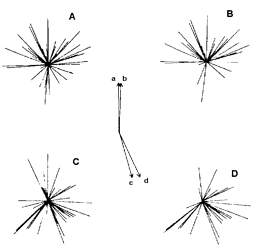 |
Science Frontiers ONLINE No. 63: May-Jun 1989 |
|
|
A Magnetic Sense In Mice
 Orientation responses of mice displaced in a normal geomagnetic field (A & B) and a reversed field (C & D). Mean directions are indicated in the center (a-d). |
"Abstract. We displaced white-footed mice (Peromyscus leucopus) 40 m away from their home areas and released them in a circular arena. Mice concentrated their exploratory and escape activity in the portion of the arena corresponding to home direction. In another group of mice, we reversed the horizontal com-ponent of the geomagnetic field surrounding them during displacement. These individuals concentrated their activity in areas of the circular arena opposite home direction. Mice were not likely using visual, chemical, or kinesthetic cues to establish home direction. Tissues of P. leucopus exhibit strong isothermal remanant magnetization and may contain biogenic ferromagnetic material. Our results suggest that white footed mice have a magnetic sense and use the geomagnetic field as a compass cue."
(August, Peter V., et al; "Magnetic Orientation in a Small Mammal, Peromyscus Leucopus," Journal of Mammalogy, 70:1, 1989.)
Reference. See BMT1 in Biological Anomalies: Mammals I for more on magnetic orientation and navigation. This book is described here.